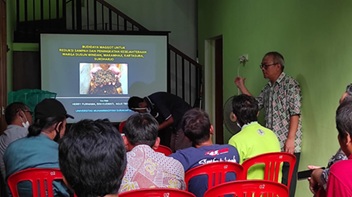Budidaya Maggot Black Soldier Fly untuk Pengolahan Sampah Organik bagi Warga Makamhaji, Sukoharjo Cultivation of Black Soldier Fly Maggots for Organic Solid Waste Treatment for Makamhaji Residents, Sukoharjo
Main Article Content
Abstract
The solid waste problem is still a topic of discussion in various forums. One of the most densely populated villages in Sukoharjo Regency, i.e. Makamhaji Village, produces a large volume of waste, and is a problem in itself. This Community Service Program invites the people of Windan, Makamhaji to process household organic solid waste through maggot bioconversion which can also have economic value. The team carried out socialization and community empowerment activities to reduce the amount of waste through maggot cultivation which can decompose organic waste into protein as part of the life cycle of black soldier flies (BSF). This program aims to provide technological information in maggot cultivation and improve the quality of human resources. The methods applied are through training, mentoring, monitoring, evaluation, provision and lending of facilities, and increasing cooperation networks with business actors in the field of waste processing. Community service activities have succeeded in fostering residents to carry out maggot cultivation and are quite productive so that they can increase income.
Downloads
Article Details

This work is licensed under a Creative Commons Attribution-ShareAlike 4.0 International License.
Authors who publish with this journal agree to the following terms:
- Any article on the copyright is retained by the author(s).
- Author grant the journal, right of first publication with the work simultaneously licensed under a Creative Commons Attribution License that allows others to share work with acknowledgment of the work authors and initial publications in this journal.
- Authors are able to enter into a separate, additional contractual arrangements for non-exclusive distribution of published articles of work (eg, post-institutional repository) or publish it in a book, with acknowledgment of its initial publication in this journal.
- Authors are permitted and encouraged to post their work online (e.g., in institutional repositories or on their websites) prior to and during the submission process, as can lead to productive exchanges, as well as earlier and greater citation of published work.
- The article and any associated published material is distributed under the Creative Commons Attribution-ShareAlike 4.0 International License
References
Ardiarini, N. R., Firdaus, M., Widodo, E., Gama, Z. P., & Sujoko, A. (2023). Pelatihan Budidaya Maggot pada Anak Asuh di Panti Asuhan Muhammadiyah Malang. PengabdianMu: Jurnal Ilmiah Pengabdian Kepada Masyarakat, 8(4), 593–599. https://doi.org/10.33084/pengabdianmu.v8i4.4295
Gold, M., Tomberlin, J. K., Diener, S., Zurbrügg, C., & Mathys, A. (2018). Decomposition of biowaste macronutrients, microbes, and chemicals in black soldier fly larval treatment: A review. Waste Management, 82, 302–318. https://doi.org/10.1016/j.wasman.2018.10.022
Lalander, C., Diener, S., Zurbrügg, C., & Vinnerås, B. (2019). Effects of feedstock on larval development and process efficiency in waste treatment with black soldier fly (Hermetia illucens). Journal of Cleaner Production, 208, 211–219. https://doi.org/10.1016/j.jclepro.2018.10.017
Nguyen, H. C., Liang, S. H., Li, S. Y., Su, C. H., Chien, C. C., Chen, Y. J., & Huong, D. T. M. (2018). Direct transesterification of black soldier fly larvae (Hermetia illucens) for biodiesel production. Journal of the Taiwan Institute of Chemical Engineers, 85, 165–169. https://doi.org/10.1016/j.jtice.2018.01.035
Nguyen, T. T. X., Tomberlin, J. K., & Vanlaerhoven, S. (2013). Influence of resources on hermetia illucens. (diptera: Stratiomyidae) larval development. Journal of Medical Entomology, 50(4), 898–906. https://doi.org/10.1603/ME12260
Rahayu, W., Darsono, D., Marwanti, S., Ferichani, M., Barokah, U., Antriyandarti, E., & Ani, S. W. (2023). Pemberdayaan Bank Sampah Gemi Nastiti untuk Meningkatkan Kesejahteraan dan Kualitas Lingkungan di Desa Makamhaji Kecamatan Kartosuro Kabupaten Sukoharjo. PengabdianMu: Jurnal Ilmiah Pengabdian Kepada Masyarakat, 8(1), 103–111. https://doi.org/10.33084/pengabdianmu.v8i1.3802
Ravi, H. K., Vian, M. A., Tao, Y., Degrou, A., Costil, J., Trespeuch, C., & Chemat, F. (2019). Alternative solvents for lipid extraction and their effect on protein quality in black soldier fly (Hermetia illucens) larvae. Journal of Cleaner Production, 238, 117861. https://doi.org/10.1016/J.JCLEPRO.2019.117861
Sollikah, A. A., Arifin, M. F. F., Sunyahni, D., Muchti, E., Sumawang, S. A. E., Farihin, M., Arrasyid, A. Y., Anshoriah, K., Prasetyo, R. H., & Kusuma, A. (2024). Edukasi Masyarakat Jatirejo Mojosongo dalam Meningkatkan Perekonomian melalui Budidaya Maggot Berbasis IoT untuk Pengolahan Sampah Organik. PengabdianMu: Jurnal Ilmiah Pengabdian Kepada Masyarakat, 9(1), 11–18. https://doi.org/10.33084/pengabdianmu.v9i1.5593
van Huis, A., & Oonincx, D. G. A. B. (2017). The environmental sustainability of insects as food and feed. A review. Agronomy for Sustainable Development, 37(5). https://doi.org/10.1007/S13593-017-0452-8
